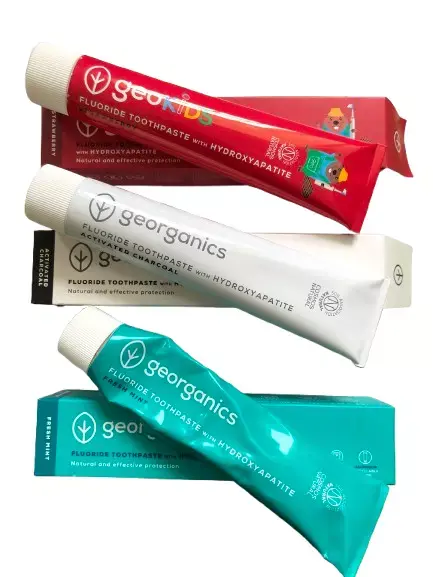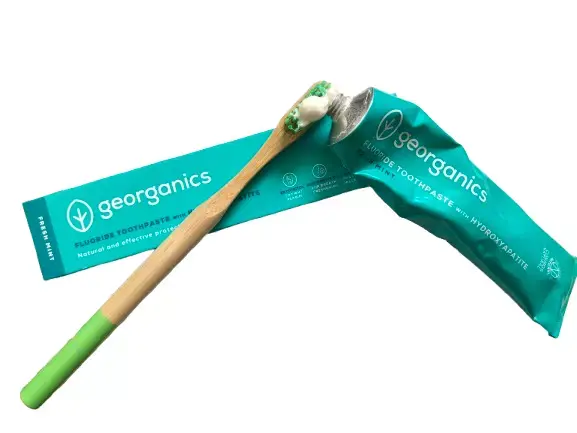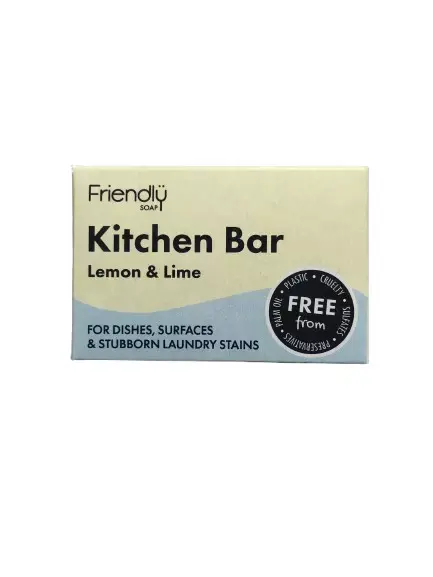
Swap your lip balm tube for this tin and kiss another plastic container goodbye!
Soothe and soften your chapped and dry lips with this little pot of natural nourishment. Why these ingredients? Honey and beeswax are used for their emollient properties, helping to protect your lips from the elements. Cocoa butter is added for its rich moisturising abilities and chamomile to help soothe and calm sores or irritations. These ingredients smell divine when mixed together!
Honey and Chamomile Lip Balm 15ml
Lip balms in plastic tubes or containers - something nearly everyone has at least one of in their home, if not their bag. Easy to lose and you can never find one when you need it, so you end up with a stash of half-used plastic tubes of lip balm. Wouldn’t it be nice if all those small plastic tubs and tubs were replaced with something a bit more environmentally friendly?
…But can’t you get tinned lip balms already, I hear you cry? What about Vaseline for example? Well yes, but Vaseline is petroleum jelly, which is derived from oil, and the oil industry is not exactly eco-friendly.
It comes in a small recyclable aluminium tin. No artificial fragrances, preservatives or additives needed here, just pure and natural ingredients that do the job.
As someone who can’t leave the house without having a tub of lip balm on me, I wanted to find one that worked well and felt like it lasted so I wasn’t having to reapply it every five minutes. This lip balm does the trick! All the soothing, calming and moisturising ingredients band together to make top nourishment for your dry lips. Just what you want really 😊.
At £4.95, it seems quite pricy in comparison to the cheap plastic tubes or tins of petroleum jelly, but if you compare it to similar tinned lip balms with more natural ingredients it’s not too bad at all. (I once accidentally paid £8 for a lip balm from a well-known very fragrant high street shop because it didn’t have the price on it and nearly died of shock.) This product is made by a smaller company and contains more expensive ingredients, so the price isn’t too excessive for what it contains. You don’t need much either when applying it, so it should last a long time. The shelf life is around 12-18 months, so plenty of time to use it up in.
What are they made from?
Sweet Almond Oil (Prunus dulcis), Organic Extra Virgin Olive Oil (Olea Europa), Organic Beeswax (Cera alba), Organic Cocoa Butter (Theobroma cacao), Organic Fairtrade Honey, Chamomile Essential Oil (Anthemis nobilis). Limonene* *Naturally occurring constituents of the essential oil used.
Where do they come from?
Akamuti is based in Wales. Only ‘100% natural botanical ingredients' are used in Akamuti’s products.
Are they sustainable?
Sweet Almond Oil -
Organic Extra Virgin Olive Oil - Olive oil does have some environmental issues within its production, mainly due to intensive farming methods. A lot of olive oil farming is, however, still done by small scale farmers using traditional methods, which is much better for the environment. Akamuti say ‘Our organic olive oil is fairly traded with farming co-operatives in Nablus, Palestine. Ancient olive trees are tended by farming families who have cared for their trees for generations and it is the olive tree which sustains approximately half of the population. Farming in the West Bank is difficult and fraught with hardship, so supporting the production of olive oil provides a valuable outlet for this fragile economy.’
Organic Beeswax and Organic Fairtrade Honey - Organic means pesticide-free. Pesticides kill bees and can contaminate the hive and the products such as beeswax and honey we get from bees. We will have much healthier, happier bee populations if we use organic bee products. Beeswax is one of the most environmentally friendly and sustainable waxes.
Akamuti have plenty to say about where they source their honey and beeswax from… ‘Our organic certified beeswax and honey supplies are fairly traded with forest beekeepers living in the vast stretches of virgin forest throughout Zambia and Ethiopia. Beekeeping is one of the few sources of income in these areas. The forests are untouched by development and pollution. The wild bees are resilient to disease and never come in contact with antibiotics, sugar feeds or organophosphate treatments. The forest beekeepers construct bark hives which they hang high up in the trees to provide a home for swarms of wild bees. After two years the honeycombs are ready to be cut and the villagers set out to harvest them. They take around half of the honeycombs, leaving the bees plenty of supplies. These beekeeping skills are vital in maintaining the survival of the people and the forest. The forest is integral to the beekeeper’s survival and this ensures that the forest is kept the way it always has been, an environment on which they rely and work with. Our fragrant beeswax and honey are full of the goodness of the forest.’
Organic Cocoa Butter - Cocoa butter comes from the cacao plant. With the rising demand for chocolate and products such as cocoa butter as an ingredient, yields of this crop will not increase enough to keep up. So, stop eating chocolate! (Or just cut back, no need to get drastic. As long as everyone doesn’t start acting like they are trying to win the golden ticket to Willy Wonka’s chocolate factory, we are ok for now.) Akamuti source their cacao butter from Peru.
Chamomile Essential Oil - I can’t find much information on chamomile as a crop, so I’ll assume it is ok for now.
(Container) Aluminium – The container is made of aluminium, which is the most abundant metal in the Earth’s crust, making up about 8% of it. Aluminium is very chemically reactive, so is mostly found combined with many different types of mineral. It has a low density and doesn’t corrode easily (although it does react to dissolved chlorides such as sodium chloride/salt), making it a very useful material, and is often used for transportation of other materials for these reasons. Aluminium was not produced as a metal until the 1800’s, so widespread use of aluminium metal did not begin until nearly a century later. Although aluminium is an abundant element, deposits of ores which can be used to make aluminium metal are not as common as you’d expect given the amount of it the Earth contains. China is responsible for most of the output and production of aluminium. It is very energy-intensive to create, so most smelting forges are located in areas where electricity is cheap. The energy use is so high, that in the US aluminium production uses 5% of all the US’s electricity! Which is why recycling aluminium is extremely important, as recycling aluminium uses only 5% of the energy it would take to create virgin aluminium, a huge difference. It is one of the most valuable materials for recycling for this reason, and recycling rates tend to be higher than for most other materials. Most aluminium cans will be made from recycled material or contain a high percentage of recycled content. Aluminium is one of the most easily recycled materials, as it can be recycled over and over again without any downgrade in quality, unlike plastic, which is ‘downcycled’ as the quality of the material decreases each time it is recycled.
How about ethical?
Akamuti’s Ethical Policy – ‘We are passionate about trading ethically and fairly. This means we try to think holistically about our ingredients, i.e. where they come from, where they are grown and harvested and the environmental impact that this may have on their immediate surroundings. Whether it be argan oil from Morocco or shea butter from Ghana – we believe in promoting sustainability from start to finish, so that everyone benefits!
We believe that by paying fair prices to small businesses for their produce, it will provide growers with a sustainable income. This enables them to build a better, more sustainable life for themselves and their communities. Fair prices contribute toward protecting vulnerable livelihoods and environments. Poor prices paid for high quality, labour-intensive products result in undermining the value of a product and the people who produce it. Unfair trade feeds the oppressive cycle of poverty and we believe that we can break that chain by supporting fair trade practices and principles.’
Extra good stuff:
Environmental Policy – Sustainability is really important to Akamuti – ‘We don’t use any unsustainable ingredients from endangered plants or tree species such as sandalwood and rosewood. If we’re aware that using a certain plant contributes to habitat destruction, we’ll choose something else!’ (…This is a very refreshing pledge, as all too often brands choose ingredients without thinking back through their supply chain, this is true even of a lot of ‘eco-friendly’ companies sadly. We all need to be more holistic like this, everything comes from somewhere after all, who knows what knock-on effects we are having if we are ignorant in this way? As you know, ABP does it’s best to combat this with the research we do on the ingredients and materials in the products we sell.)
Akamuti have an eco-friendly office, using recycled paper and environmentally friendly packaging. They have a zero-waste policy in their office and they recycle or compost all of their waste to ensure nothing ends up in a landfill.
Akamuti uses organic ingredients, but for those wondering how this is checked: ‘All of our organic ingredients come from an accredited source, usually the Soil Association or Ecocert. We are not certified or licensed by the Soil Association due to administrative and membership costs.’ Sadly, being independently audited by certification schemes is usually very expensive, making it out of reach for lots of otherwise very compliant, passionate small businesses ☹.
Cruelty-free - ‘At Akamuti, we are totally against all forms of animal testing and ensure that all our raw ingredients are sourced from animal-friendly suppliers. Our fixed cut-off date is the same as our company formation, i.e. July 1st 2003. We have never tested any of our products on animals and it has been our priority to source ingredients from suppliers who uphold the same policy. This means that none of our ingredients or end products have ever been or ever will be tested on animals. Our preparations are tested by willing people and assessed for safety by our laboratory.’
Conclusion –
Pout about plastic pollution all you want, without your lips feeling sore, with this lovely little tin of plastic-free and petroleum-free lip balm!































